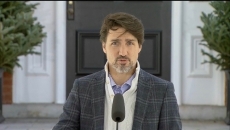Home sales in the Greater Vancouver area continued their steep year-over-year drop last month amid confinement measures and physical distancing requirements related to the COVID-19 pandemic.
The Real Estate Board of Greater Vancouver said Tuesday home sales totalled 1,485 in May, a nearly 44 per cent decrease from May 2019 and 54 per cent below the 10-year average for the month.
However, the figures marked a notable increase from 1,109 home sales in April, the lowest total for the month since 1982.
Board chairwoman Colette Gerber said buyers and sellers are becoming more comfortable navigating physical distancing hurdles, with virtual interactions more prominent than ever.
"Home sale and listing activity is down compared to typical, long-term levels and up compared to the activity we saw in April 2020," Gerber said in a statement.
"Home buyers and sellers are adapting today, becoming more comfortable operating with the physical distancing requirements that are in place in the market."
Home prices in the Greater Vancouver area have remained steady despite the recession triggered by the pandemic.
The real estate board said the MLS home price index composite benchmark price for all residential properties in Metro Vancouver was $1.03 million, virtually unchanged from April and up 2.9 per cent compared with May 2019.
There were 3,684 detached, attached and apartment properties newly listed for sale on the Multiple Listing Service in Metro Vancouver in May, down 37.1 per cent compared with May 2019, but up 59.3 per cent compared with April 2020.
In its outlook last week, Canada Mortgage and Housing Corp. said it expects the housing sector will see a retreat in prices, sales and building in the months ahead and likely won't see a return to pre-pandemic levels until at least the end of 2022.
The federal housing agency said average housing prices could fall anywhere from nine to 18 per cent in its forecast, and as much as 25 per cent in oil-producing regions.
In the faster recovery scenario, prices could start to recover by mid-2021, while in a slower recovery prices might not be back to pre-COVID-19 levels at the end of 2022.






